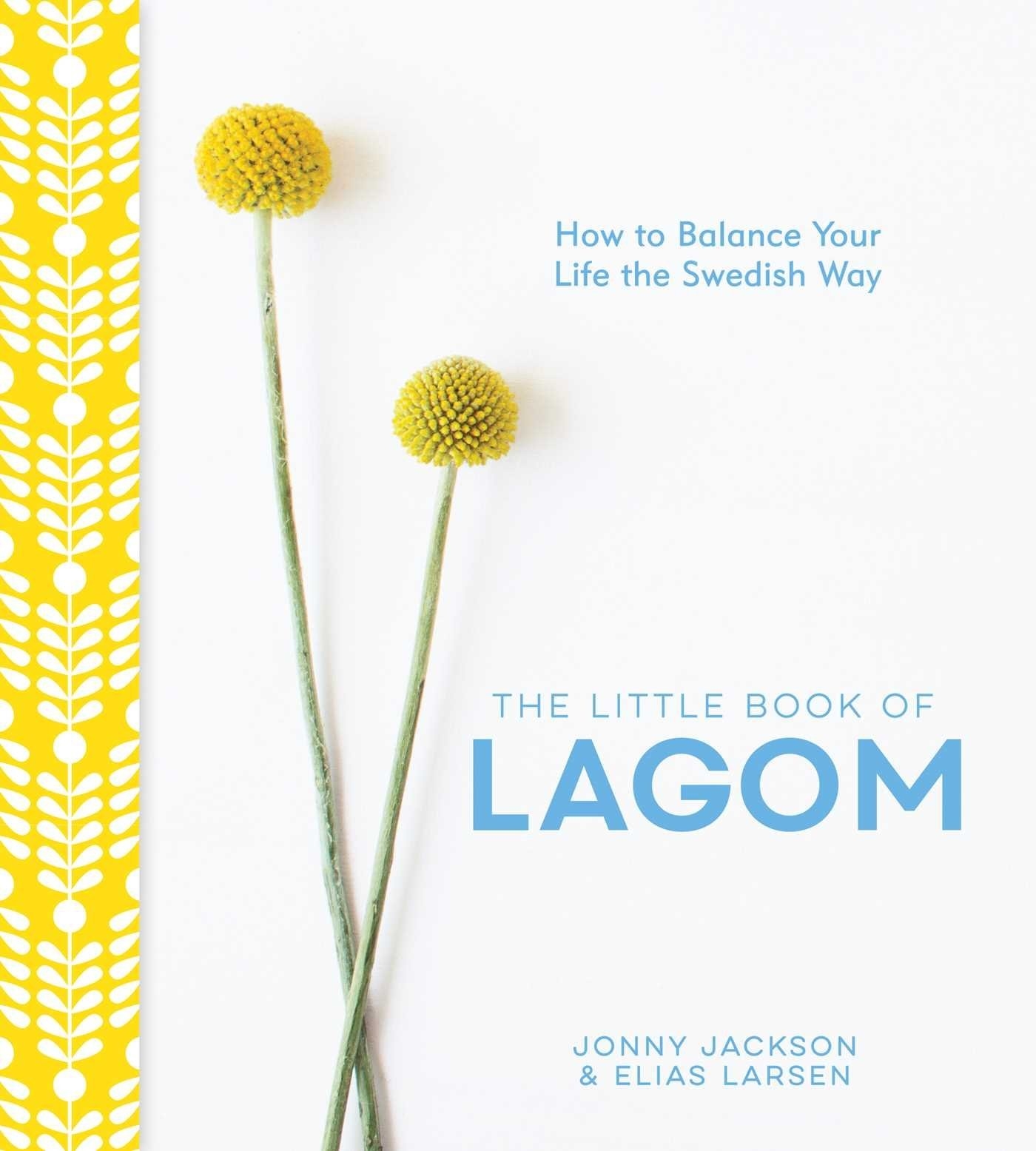Lagom (pronounced lah-gom) is a Swedish word that means “not too much and not too little, but just the right amount.” It’s about moderation, efficiency, and fairness. In The Little Book of Lagom: How to Balance Your Life the Swedish Way, Jonny Jackson and Elias Larsen share tips, projects, hacks, and quotes that will help you live your life with more balance, intention, and simplicity. Below, some tips to bring a little more peace into your work life.

1. Try these 10-minute morning hacks.
It’s amazing how much tidying and decluttering can be done in a few minutes before you begin your working day. These tips are a great way to ease yourself into simplifying your life and getting off to a good start:
● Go through your pile of mail (yes, we all have one) and open everything. Chances are you will be able to discard most of it. If it’s mail that has sensitive information — bank details, for example — either shred it or invest in a garden incinerator. File away things you want to keep in a expanding file folder with labeled compartments, such as house, medical, work, children, pets, etc.
● Book all your appointments in one round of phone calls: dentist, optician, doctor, hairdresser, etc.
● Select three of your favorite songs and tidy your workspace while the songs are playing — it’s so much easier to work in an uncluttered and attractive environment, and listening to great music will set you up for the day.
2. Be mindful of media consumption and what you absorb.
Think about how watching the news before you go to bed might affect you, for example. Limit your worries and allow yourself to enjoy your last hour before bed by reading a good book or having a conversation with your partner, or calling up a friend and having a good gossip session.

3. Get organized.
Being organized involves forward planning, and though it can be hard to get motivated — even to do something simple such as picking out your outfit for the next day when you’d rather go to bed, for example — your future self will thank you for it.
● Pick a quiet time on the weekend to go through your work commitments, family activities, etc., for the week ahead so you know what’s coming up. Don’t get caught unprepared when your child has been invited to a costume party and they’re the only one in plain clothes!
● The night before a work day, get your clothes ready for the next day. Make sure they’re ironed, select accessories and shoes (give these a polish), and you’ll find the morning routine a whole lot easier.
● If you have to share a bathroom with others, arrange a time slot so there’s no hanging around as you wait to use it. It might sound a little militant, but it will reduce your stress levels.
● As soon as an appointment is made, or a meeting is organized, add it to the schedule, be it an old-school notebook or an online calendar system.
4. Don’t compare yourself to anyone else.
It’s common to compare yourself with others, such as considering someone else to have a better job, a bigger house, more money, etc., than you, which steers you away from looking at all the positive things happening in your life.
Don’t believe that emulating others will make you happy; try to be the best version of you and look at the areas in your life that could be improved upon as well as recognizing and appreciating what you’re good at.
Whenever you find yourself comparing yourself to someone else who you consider to have “more” of something that you want, or a “better” life, remember the lagom principle of not being perfect but “just right” for you. Remind yourself of your achievements and allow yourself to feel good.

5. Keep it simple when communicating with others.
● Emails — Deal with these in batches rather than as they come in. Some people get very impatient if they don’t receive a reply within the hour, but don’t feel stressed. Go at your own pace; work through one or two items on your to-do list before attending to your emails. If you find this hard to do — especially when you see a reminder popping up at the side of your screen — then turn off your email notifications until you are ready to address them.
● Meetings — Assess whether a meeting is required to discuss a particular issue, or if it's an excuse for a coffee and a chat. A phone call might be enough.
● Making requests — Be concise and clear about your requirements and always include a workable deadline. Follow up with an email to clarify the details.
● Dealing with difficult people — Try to nip issues in the bud before they escalate. If you experience unpleasant behavior in the workplace, do your best to avoid a confrontation, document the incident, and inform your manager.
6. Simplify your work week.
Does your day start off with good intentions and a list of items to be fulfilled, only for you to get to the end of the day and find barely anything has been done, because other things have gotten in the way?
Ask yourself these questions:
● Am I taking on too much?
● Am I making the best use of my time?
● Am I happy with the way I'm spending my time?
We are all guilty of taking on too much — often because we are encouraged to challenge ourselves, and have a fear of saying “no” to things and missing out on something important. The reality is, if you spread your time too thinly, you won’t be able to do your best job on the things that are most important to you. It’s also likely that you will become stressed and neglect your personal needs.
Take a look at your schedule and highlight the areas that would benefit from more time being spent on them, and look into how you could delegate other tasks or find a more efficient way to get them done.

7. Keep challenging yourself.
It may take years of patience and determination to master a skill, such as drawing well or learning a foreign language, but studies show that you have a greater chance of being happier day-to-day in the long term if you actively pursue a pastime or course of study. That feeling of losing yourself in study or a creative pursuit is referred to as “flow,” and this state, according to some psychologists, is where true contentment lies.
8. Balance thinking vs. doing.
It’s a constant internal argument for many — thinking about doing something over actually doing it. It’s important to strive for the things we want and go for our goals, but there’s one thing that can stop us: procrastination. Here are the common excuses we tell ourselves:
● "I don’t have time to do it.”
● “I might fail.”
● “If I leave it, someone else can sort it out.”
● “What if I succeed and I find I can’t cope?”
Switching from intention to action is a huge step. Now it’s time to get motivated.
It can be easier to encourage others in their plans than to motivate ourselves, so getting a support team in place can be a good way of working toward your goals. Maybe you have friends who have plans of their own? You needn’t be going for the same goal: One person may be eager to start a new health regime, while someone else may want to change their job or study for a new degree.
What matters is that you find a time to meet regularly and update one another on your progress. Even if it’s a quick 15-minute chat after work or a coffee on a Saturday morning, you’ll come away feeling boosted by their enthusiasm and advice, and they’ll feel the same way, too.
9. Press pause.
Life is short and it’s important that you factor in time to do the things you enjoy. Schedule some downtime on your calendar each week. If you have wall-to-wall commitments, think about whether you really have to do everything on your calendar.
Will anyone notice if you take bought items along to a party rather than cooking something yourself? Can you arrange to swap babysitting or other duties with a friend if you agree to return the favor another time? If you have kids, set up a regular appointment with a babysitter, if possible, or introduce an hour of “quiet time” at the end of each school day so that you can all unwind.
Once you’ve found yourself a regular slot, don’t forget to plan what you want to do in that time, otherwise you’ll end up drifting around, catching up on the housework or emails.
10. Be grateful for what you have.
Start a daily gratitude journal. List all the positive things in your life — from the small things that make you smile, such as the view from your window, to the bigger things, such as your health or your family. At night, list three things you were grateful for during the day and you’ll soon start focusing naturally on the positives.
For more information on The Little Book of Lagom: How to Balance Your Life the Swedish Way, click here.

All text reprinted with permission from The Little Book of Lagom: How to Balance Your Life the Swedish Way © 2018 by Andrews McMeel Publishing. First published in 2017 by Summersdale Publishers, Ltd.
